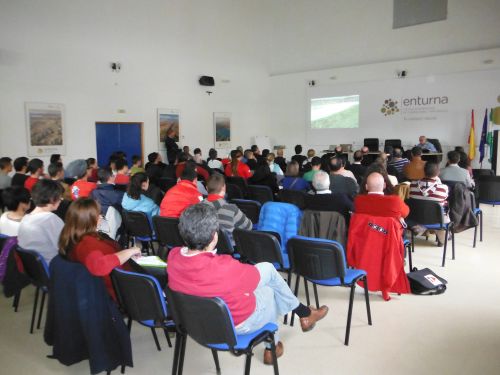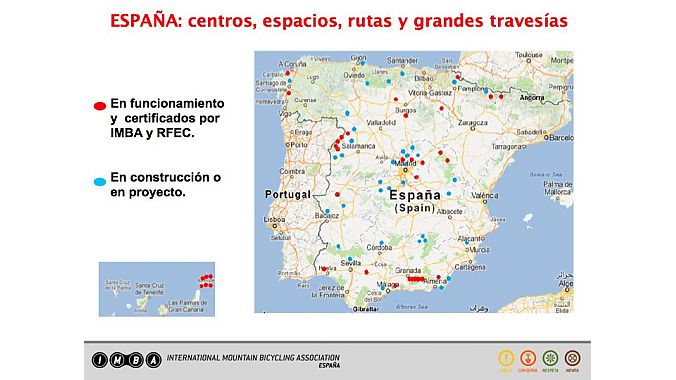By Wendy Booher
GUADIX, Spain (BRAIN) — El Patronato Provincial del Turismo de Granada, the provincial tourism department of Granada, recently convened more than 80 participants representing 18 business sectors at Enturna, the International School of Rural and Environmental Tourism, to boost efforts for developing cyclotourism in Spain.
The program, "Cyclotourism, a singular potential for tourism," presented cyclotourism as travel pivotal to the bike, and categorized it as loaded touring (with panniers), sport tourism (racing, gran fondos, supported tours, mountain bike parks), and urban cyclotourism (bike sharing, city bike tours). Seven presentations focused on merging Spain's existing infrastructure of resources, including roads, mountains, peaks, climate, restaurants, and lodging with opportunities to develop cyclotourism.
"Spain is a country with unmatched cultural, natural and gastronomic appeal," said Luis Muñoz, marketing director for Trek Spain. "The weather and the terrain are increasingly attracting tourists from colder countries, who can enjoy their favorite pastimes for many more months out of the year."
Despite Spain's reputation as a road cycling destination, which Muñoz cited as a distinctly foreigner's view of Spain and added that in fact, the mountain bike market share in Spain is greater than that of road cycling, the conference's main trajectory seemed slanted toward off-road cyclotourism.
The 2,000-kilometer TransAndalus off-road circuit takes advantage of southern Spain's vast network of dirt roads. The Andalusian Bicycle Plan that's currently in progress aims to complete 4,000 kms. of off-road routes by 2014 or 2015. Smaller projects, like the 450 km TransNevada, which established a mountain bike route within a national park, was unprecedented when it was introduced early in 2012. More than 34 projects are in development as either mountain bike parks, zones marked for mountain biking, and marked long and short-distance off-road routes.
Spain's rugged topography, which has been a persistent problem for the country's transportation infrastructure, conversely make it an economic draw for mountain biking. Between 2011 and 2013, Zona Zero, an enduro mountain bike park in the Pyrenees, more than tripled the number of room occupancies from 3,882 to 14,000, according to Office of Tourism statistics.
"I would say that Spain is in a magnificent situation because it's a very mountainous country," said Victor Tarodo, vice president of the International Mountain Bicycling Association of Spain. "If we overlook two zones: Albacete de la Mancha and Tierra de Campos, which are enormous plains, the rest is mountainous in all regions."
Spain counted 16 million cyclists above the age of 14 in 2011 and estimated that 74 percent of those participate in non-competitive events, according to statistics compiled by IMBA Spain. Both Trek and Specialized, which each count more than 20 years in the Spanish market, share the opinion that the cycling market has completely changed in recent years.
"Cycling has totally evolved in the past few years with respect to participation and disciplines," said Yuriy Tomas, director of marketing for Specialized Spain. "More people are engaging in cycling and there are more categories, like urban and fitness, in addition to road and mountain biking."
Muñoz added that, while the consumer market among Spaniards is increasing, greater potential for cyclotourism resides with the European consumer, who looks to Spain as a paradise for cycling.
"What's needed is a route that's well-known," remarked Pascual Rivas, one of the conference presenters. "We have great weather, roads, mountains, and food but at present, there isn't adequate promotion, signage, or route itineraries. When this is accomplished and presented to the public, cyclotourism will experience huge growth. There's lots and lots of potential."




